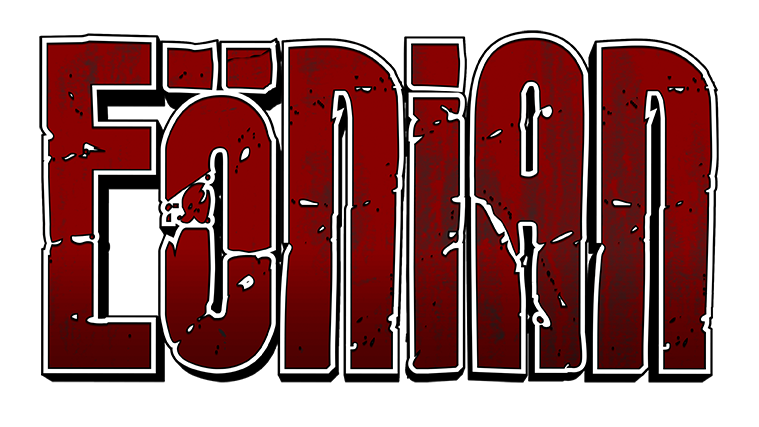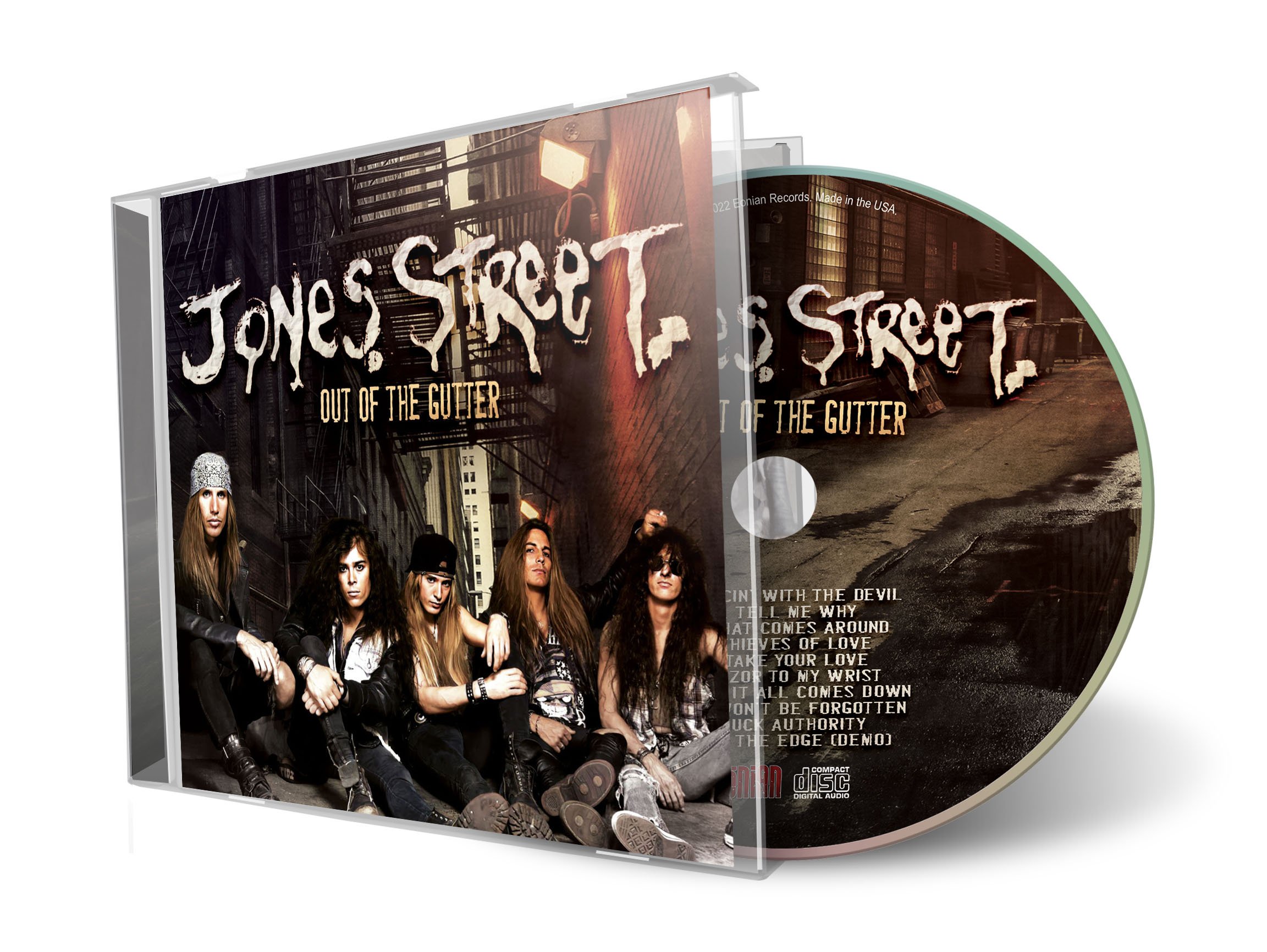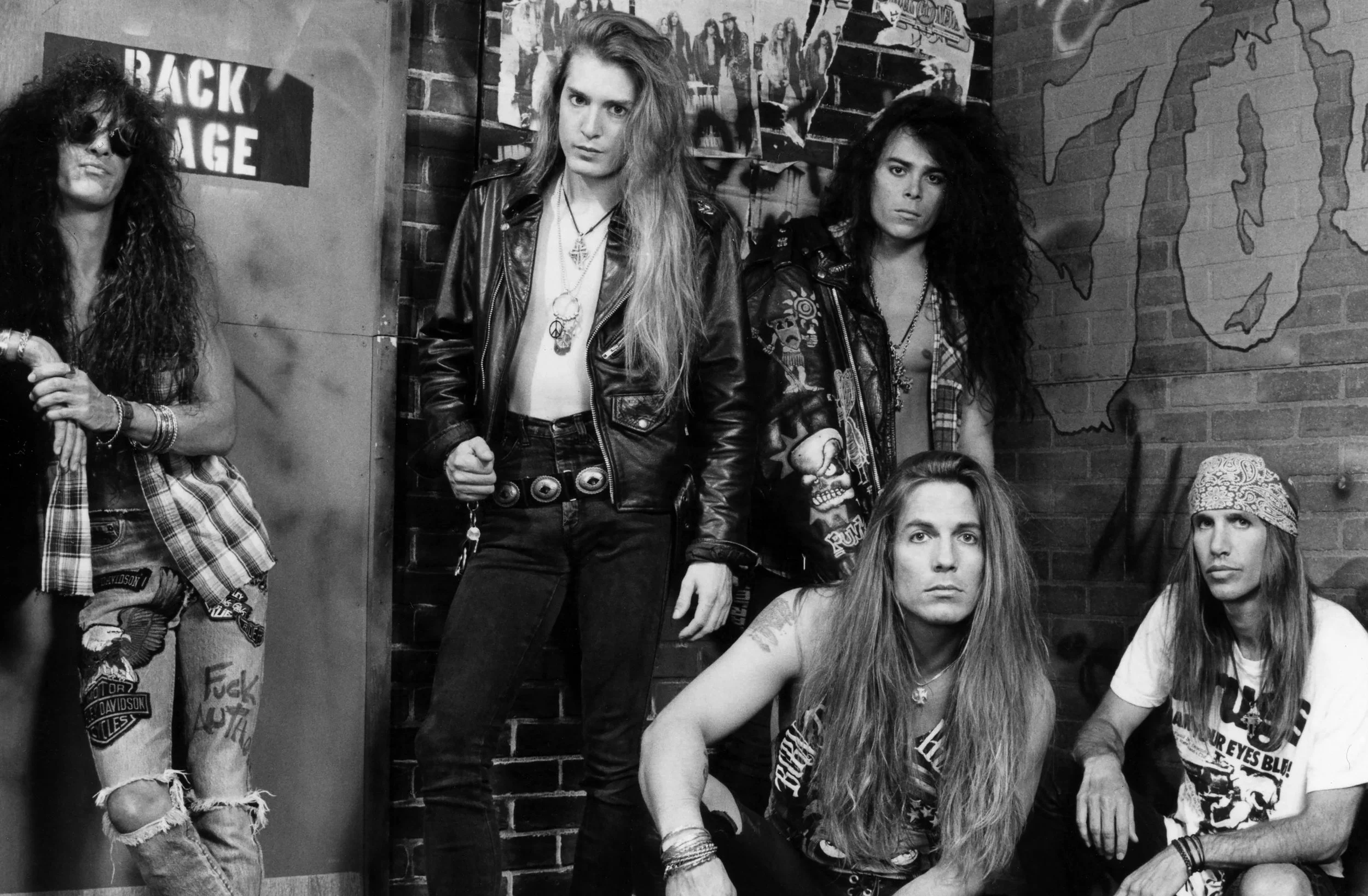JONES STREET - Out Of The Gutter
From Los Angeles, California | Release Date: June 16, 2022 | Catalog #: ER00039
Shawn Crosby - Lead Vocals
Jonny Jones - Guitar & Vocals
Mickey Perez - Guitar & Vocals
John (J.J.) Jauregui - Bass
Rob Hanna - Drums (1990-91, Tracks 1,2,4,5, & 10)
Anthony Focx - Drums (1992-94, Tracks 3, 6-9)
1. Dancin’ With The Devil
2. Tell Me Why
3. What Comes Around
4. Thieves Of Love
5. Take Your Love
6. Razor To My Wrist
7. When It All Comes Down
8. We Won’t Be Forgotten
9. Fuck Authority
10. On The Edge (Demo)
LISTEN
Full-force, combat boot-to-the-head, hard rock, with intensity turned up to level eleven. This is far from another “strip band.” Combining the energy of Skid Row with the attitude of Guns N’ Roses, JONES STREET delivers a unique sound with catchy choruses and pounding grooves.
The trio of bassist John “JJ” Jauregui and guitarists Mickey Perez and Jonny Jones already had a long history behind them before JONES STREET came into being in 1989, the threesome having first worked together in the late ‘80s San Diego outfit Point Panic. With the addition of singer Rick Monroe, they would gain notice after changing their moniker to that of the surname of their new frontman, the band going on to play countless shows in Southern California and the Midwest. Something that would culminate with a sold-out arena set in Hawaii opening for Mötley Crüe on their ‘Dr. Feelgood’ tour in front of an audience of some 18,000 rabid fans.
Shortly after that tour, Monroe played at a large Hollywood celebrity-filled industry showcase, which went so well that their management asked them to hold off on any more live performances, preferring to focus on getting them into the studio instead. The band’s frontman thought that was the wrong move and decided to depart, leaving the remaining quartet to head to Los Angeles to seek out a new lead singer.
Having witnessed him perform on stage with Orphan, charismatic vocalist Shawn Crosby was offered the chance to come in and jam with the band. The new five-piece of “JJ”, Perez, Jones, Crosby, and drummer Rob Hanna clicked immediately and with that, JONES STREET was born.
Hanna left the band not long after, but the final piece of the jigsaw was locked in place with the introduction of Anthony Focx, a drummer already well known on the local scene and beyond. The percussive powerhouse having appeared in the box office smash Wayne’s World and the promo video for Alice Cooper’s hit single, “Poison”.
Initially, the JONES STREET sound was heavily influenced by the likes of AC/DC, Skid Row, Aerosmith, Van Halen, and Guns N’ Roses, but as time progressed the quintet added a heavy, raw, powerful attack all their own. Something that would lead to regular shows at legendary venues such as the Bacchanal Club, Exposure 54, Gazzarri's, Roxbury, Scream, The Cathouse, The Roxy, The Tropicana, The Troubadour, Waters Club, Whisky a Go Go, and especially FM Station, a venue which JONES STREET very much saw as their home away from home.
Rubbing shoulders on and off stage with everyone from Badlands, Ratt, and Slaughter to HailMary (previously Leatherwolf), Love/Hate, and Warrant the scene was positively bursting with great bands and great musicians. And with all these outfits and many more besides all jostling for attention on the Sunset Strip, friendships that could be best described as competitive camaraderie were often born and nurtured.
Hence, having built a fearsome live reputation it should be no surprise that JONES STREET also had some big hitters in their corner when it came to trying to snag that ever-elusive record deal. Legendary industry reps Irving Azoff, who had been involved with the likes of REO Speedwagon, The Eagles, and one-time bandmate of Ronnie James Dio and co-manager of Mötley Crüe, Doug Thaler, both helping JONES STREET out. The band’s manager, Barry Levine, legendary rock photographer, and band manager of KISS and Mötley Crüe, also set up industry showcases to further the outfit’s cause, while Slaughter bassist Dana Strum was pulling strings at Warner Bros, MCA, and Capitol Records.
These weren’t the only high-profile names who could see the obvious potential of JONES STREET. Having opened for Vince Neil many times at sold-out shows at both The Roxy and Whisky a Go Go, Vince Neil who was on a break from Mötley Crüe at the time, was actively shopping the band around to different labels.
With JONES STREET also garnering the attention of many influential rock publications such as BAM, Metal Edge, Music Connection, RIP, and Rock City News, as well as local radio stations KNAC and ROCK 102.1 it was Sony Records who seemed set to sign the band. With a $10,000 demo deal from the label to record some songs now in their possession, it looked like a visit to the big leagues was just around the corner, but not only was the market JONES STREET were trying to enter already saturated to bursting point, it also became clear that grunge wasn’t going away so quickly.
With the times signaling a shift in the music scene, Sony didn’t follow up on their initial interest, but JONES STREET did record some songs through the deal they had earned. In fact, across their years together the five-piece proved to be quite prolific studio musicians. The band’s guitarist, Mickey Perez recorded and produced some of the earliest demos on four and eight-track recorders, while other sessions took place with Vince Neil, and his guitarist of the time, Steve Stevens.
You might think it’s crazy that rubbing shoulders with rock luminaries such as these would not be the highlight of the JONES STREET story, but for guitarist Mickey Perez, it was the camaraderie and friendship within his band that lives longest in the memory. “When we arrived in Los Angeles, Barry Levine rented an apartment in Hollywood for us to live in. This was dubbed ‘The Jones Street House’ and soon became the setting for some raging parties. We were young back then and only owned our music gear and our clothes, so it didn’t matter to us that it was a one-bedroom place. We stacked bunk beds three high and had people sleeping on the couch, the floor, or wherever else there was room. Between the band and the road crew, there were ten of us crammed in. Those were great times!”
It is a great possibility that JONES STREET missed the last wave of signings because of their hard-edge sound. So many hard rock bands that didn’t come close to JONES STREET were signed and failed. It was because of the over-saturated market that this talented band got lost in the A&R muddle. However, always an outfit determined to succeed, and with a set’s worth of great music to excite their fans with, it took a serious leg injury to guitar player Jonny Jones to finally remove JONES STREET from the Hollywood live scene. It was in October 1994 that they reluctantly decided to bring the JONES STREET story to a close.


